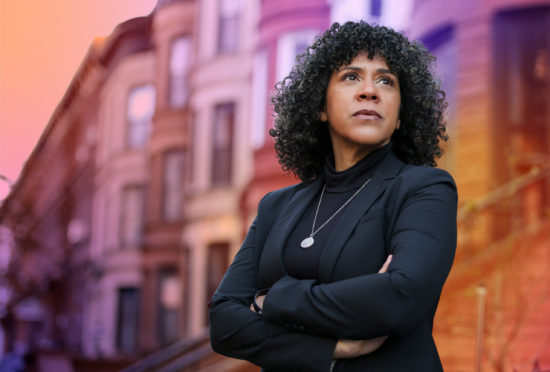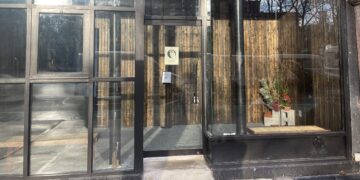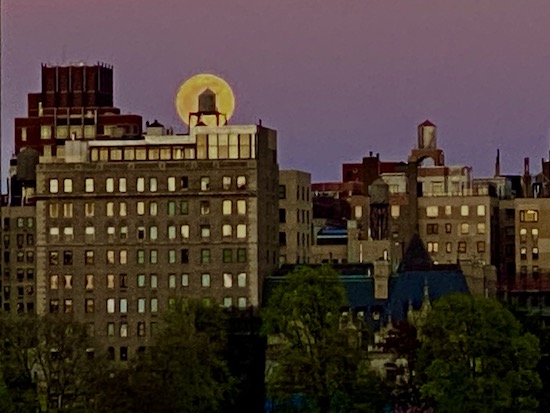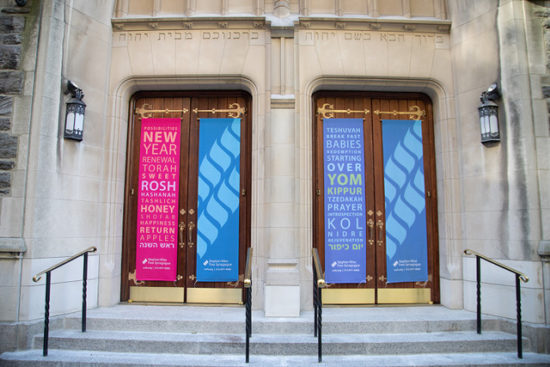
By Michael McDowell
Dianne Morales may be a relative newcomer to New York City politics, but her campaign for mayor has gained momentum in recent weeks. The Working Families Party endorsed Morales as their second choice for mayor—behind Scott Stringer, and ahead of Maya Wiley—and Morales also recently qualified for $2.2 million in public matching funds.
Morales was previously executive director and CEO of Phipps Neighborhoods, a South Bronx-based social service provider connected to Phipps Houses, a major nonprofit developer. She also led The Door, a youth services provider, and was appointed to operations and advisory roles during both the Bloomberg and de Blasio Administrations.
The following conversation has been condensed and edited.
WSR: It’s 2025 and Mayor Morales is running for her second term. What are her specific policy accomplishments?
DM: We will have significantly transformed policing in the city, and moved towards really creating, reclaiming, and redefining what public safety means for communities that have historically been the most overpoliced and harmed by the NYPD. We will have a vast array of alternative services flowing into those communities: job training programs, mental health support, health care support, access to permanent and affordable housing, and things that really allow people to live in dignity and economic security. We will have moved away from the criminalization of poverty and the harm that policing continues to inflict on our communities. That’s my headline.
WSR: You say on your website that you also want to create “a network of integrated community health clinics across the city to provide preventative primary care.” Who will they serve, what services will they provide, and how much might they cost in terms of budget?
DM: As executive director of The Door for almost six years, I oversaw the adolescent health clinic that we operated. I saw what a difference it could make to provide no-questions-asked, relatively comprehensive care for some of the most vulnerable adolescents in the city. We don’t have a healthcare system, we have a sick care system, focused on being reactive and responsive — and that ends up being way more expensive than really being focused on prevention.
The vision for the integrated community health clinics is just that: to provide care on the ground, locally, in linguistically and culturally relevant and appropriate ways. This includes education around health and wellness, mental health services and support, primary care, and reproductive care. If we do this in communities, if we are staffing these centers with folks who are credible messengers from the community—and who can not just be tethered to the site but actually also out and about in the community building relationships, building trust, bringing people in—we have a much better chance of intervening on the front end and giving people what they need.
WSR: You were at The Door during the height of the 2007-2008 financial crisis, and moved to Phipps in 2010, during the long recovery. The city is facing a budget crisis now. As a candidate who has managed budgets and scarce resources during lean times, what will you do during a period when, realistically, the focus may be on preserving the services we have as opposed to creating new ones?
DM: A couple of things in response to this. I am the only candidate in this race who has for decades directly been responsible for the delivery of services to people—services that could be life-changing, and when their lives were literally on the line.
I’m also the only candidate who understands what it means to manage a budget when you’re getting reimbursed at 80 cents on the dollar, and where the partial reimbursement of your actual operating expenses did not translate into any lower expectations in terms of volume or quality of services.
In the recovery of New York City, we are going to heavily rely on nonprofit service providers to care for those that are the most vulnerable. It is important for us to not just bolster that nonprofit sector, but also to have a mayor who understands that the brunt of the weight of our recovery will be borne by them.
I also fundamentally reject the notion of an austerity budget. I think that’s just a signal to the poor that we need to get ready, because whatever burdens we’ve already borne disproportionately, we’re gonna have even more. I understand that in 2022, the budget for New York City won’t be like it was in 2019. But we are still the wealthiest city in the country, if not the world. My priority is to create a budget that elevates those who have been most marginalized, because, by doing so, we will all benefit. We have seen over the course of the last 15 months that those New Yorkers are actually the people who keep the city running and make it possible for those who work at home to do so.
WSR: Speaking of a place where a lot of folks who keep the city running live: the New York City Housing Authority (NYCHA) is currently undergoing Rental Assistance Demonstration (RAD) conversion. In RAD, a federal program through which housing agencies are able to obtain much-needed capital to repair and renovate decaying developments, management of developments is privatized. You do not support RAD, is that correct?
DM: That is correct.
WSR: Why?
DM: RAD is a really slippery slope towards privatizing public housing, and I believe that we need to prioritize keeping public housing public.
WSR: Are you a public school or a private school parent, and can you talk about that decision?
DM: Public school. My kids graduated from public high schools, they’re both in college now. I am a believer in public schools. I think that our public schools could and should be the best in the country. We are far from that. I also believe in public education as something that everyone should have access to. Full disclosure: My daughter went to a private school for six years for children with learning differences, and I sued the Department of Education for those six years for their failure to provide her with the education that would meet her needs.
WSR: District 3 schools—the Upper West Side and portions of Harlem—were actually the first to tackle segregation in public middle schools. In terms of integrating New York City schools, are there any policies you favor? What’s working and what isn’t working?
DM: I am an educator, the only one in this race. I attended and taught in the New York City public school system. I actually taught in the same school where I went to kindergarten. I believe we need to move aggressively to desegregate our schools. I think we need to eliminate all screenings and barriers to admissions that, in fact, facilitate segregation. There’s a need for us to have real leadership at the city level that is willing and able to stand for what real equity and justice means for the 1.3 million students that are predominantly low-income black or brown students. And that requires some political courage.
WSR: Community District 7—the Upper West Side—is home to the third highest concentration of seniors in the city. How would you mobilize seniors who wish to contribute and have a hand in the city’s recovery, and how will your administration care for seniors?
DM: Seniors are a critical resource. It is a crime that right now, funding for senior programming in New York City is, I think, less than 1 percent of the overall city budget. The divestment from our seniors over the years—and the tendency of the city to focus on cutting [budget] there first—is really appalling. [I will] prioritize senior services, affordable housing that combines services, really ensure that [we’re applying] the equity lens—race and ethnicity—in terms of looking at poverty rates and health, and make sure that seniors are being connected to services and advocacy
I ran senior-serving programs for the last decade in my role as the CEO of Phipps Neighborhoods, and by the way, I shared a room and a bed with my grandmother until the day I left home for college. For many years I thought that I would become a geriatrician, so seniors have a special place in my heart.
WSR: You were at the Lucerne. Does it give you pause that the city is paying private hoteliers to house the unhoused, rather than directing that money toward permanent solutions like housing?
DM: It not only gives me pause, I have called for the dismantling of the shelter system. I think we need to move away from the shelter-industrial complex, and prioritize the creation and the provision of permanent affordable housing for all New Yorkers. I think housing is a human right, and I’m committed to guaranteeing housing for all, and that means moving away from the shelter system and moving away from these hoteliers that profit from the system. I think it’s about $3 billion that is invested right now in the shelter system in New York City, and we should be investing those dollars in in the creation and the provision of affordable housing for all.
WSR: Is there anything we missed today or that I didn’t ask you about that you’d like to address?
DM: The last thing I’ll say is sort of a personal statement: I am not what is considered a traditional candidate, and my ideas for New York City are radical ideas. But I think that we’re living in a radical time, and I think we can’t unsee some of the inequities and disparities that were both exacerbated and laid bare over the last year, [and which] long pre-existed the COVID-19 pandemic. We have an opportunity right now, a window of opportunity to put a stake in the ground, to recognize how we are all interrelated and interconnected and interdependent, and to make different choices that enable everybody to have access to living in dignity. I think this is the time, and I think New York is the place. I think we can assume our rightful place as the greatest city in the world by making these changes. That’s a lot of rhetoric that we haven’t lived up to yet, but I think we can do it, and I think the time is now.
Primary Day is June 22nd. It will be the first citywide election to utilize ranked choice voting.
See all of our interviews with the candidates here.








Got it. Another “candidate” leading with vilification of police…while “offering more services” they can’t pay for. Thanks but no thanks. Midtown will become a squalid zombieland that every sensible business leader will leave. How are we going to pay for all this when basic safety is continuously undermined?
Exactly right! The only way our city will become a haven for law-abiding, tax-paying citizens again is simple: vote for Republicans!!! The inmates have run the asylum for the last 8 years. Enough is enough!
Republicans are the party of Trump and treason. They aren’t law abiding taxpayers, they’re traitors.
Voting for Republicans is a surefire way to destroy our city and our country.
Sorry but the Republican party was here a Hell of a lot longer than Trump and it stands for common sense today – as opposed to the asinine policies that have destroyed this city. Before the Democrats had the Mayor’s Office, City Council, State Assembly and Governorship – the city flourished and was safe – under Republican leadership. 20 years of prosperity gone within the last 4 years of progressive Democrats. The Republicans are the party of COMMON SENSE now. People are finally opening their eyes.
We saw where Republicans stood for the last four years–they stood with Trump. And they still do.
That’s not common sense.
Exactly. Could we please stop treating the police like the enemy? Crime is a problem. Ignoring it won’t solve it. Could there be improvements to policing? Definitely!
Neighborhoods are “overpoliced” because they are where crimes happen. I have spoken to many people in these neighborhoods who want more police, not less.
Please stop asking where people’s kids go to school. Everyone runs their own race and those who choose private school should not be demonized. I am a deeply invested public school parent but this is not relevant to me. Also, please vote for ideas, not race, gender, etc.
I disagree. I think where the candidates send their children to school is relevant. My children are in a G&T program and have received an education that, to borrow Morales’ language, “meets their needs”. Morales sued the city to get an education for her child that met her child’s needs, but wants to take away that opportunity from children who would have their educational needs met in a G&T program/screened school/etc. I have a problem with that, and so do many other parents.
I am very interested in a candidate’s education policy – it is a huge issue. But what they did with their child does not necessarily reflect their policy choices.
I am very in favor of screened schools, particularly at the middle and high school level. If I had a nickel for everyone who thought their four year old is gifted, I would be wealthy – I’m not a fan of elementary school G&T. Though if we keep it, I would forbid parents zoned for high performing schools from taking up G&T spaces – save them for those who need it more.
We already spend 6 billion dollars a year on cops in this city, and that’s still not enough for some people. It’s time to admit that giving cops more and more money isn’t the solution. Fighting crime means fighting poverty and suffering, not causing it.
Those “services” you deride will uplift people and reduce crime. Here in the UWS, and across the city.
“Will”? As in, guaranteed? When? Who’s accountable? What are the consequences if they fail? What are timeframes, deliverables, measurable results? Same as in “Thrive”? Same as in the $3+ Billion spent on DHS that resulted in zero homeless people in the streets?
I’m ready to sign on the dotted line.
Comments are limited to 100 words, my dude. If you actually want answers to those questions, this isn’t the place for it.
Her website goes into a lot of detail about her proposals, for anyone who wants to know more. It’s good stuff, and I’ll be ranking her #1 by a mile.
I’d vote for her for HPD commissioner, but definitely not for mayor. Not ever.
I agree that she is not a traditional candidate. With the city in such a precarious financial position, not the best time to pivot to a more radical agenda.
It worked for Biden!
This is the perfect time for a radical agenda. We’re seeing that in Washington and across the country.
So you want more of the same? That doesn’t make much sense. Why not abandon Party loyalty and give the other side a shot? I moved here from LA in 1996 and opted to stay. Rudy Giuliani presented me with a very functional City which surprised me. I saw strangers picking up trash in the streets and putting it in the newly installed trash receptacles. I saw a new businesses opening up in Harlem. I saw people talking to each other joyfully and happily. I even spent my first winter walking around freezing my butt off and seeing people functioning in the city despite the weather as opposed to living in Los Angeles. I was thrilled and decided to stay until this last four years have so disappointed me deeply. Maybe the other side has some answers we need to pay attention to. Maybe people who commit a crime should go to jail.
Maybe people who are mentally ill he should be institutionalized for their own good and for the good of the community.
Why not?
Right, we’re seeing the City go to ruins with the already Radical agenda. And as for what we’re seeing in Washington, New York has just lost a Congressional seat because of the Radical agenda in this City and State. People and businesses are moving in droves. Any more Radical agenda and NYC will be a ghost town.
Then who will pay for her programs?
We lost a seat because 89 people didn’t fill out their census form. NY has lost seats in the last few censuses – is that the plural form? – and this time we lost one seat. That’s not good, but in the past we lost more than that.
“…and the harm that policing continues to inflict on our communities.”
Yes, this makes sense.The police are to blame for the decline of the Upper West Side, not the criminals, drug addicts, and homeless people who need professional help and services. It is mind-boggling to think that the next mayor will be worse than the current one, but it is very, very possible.
You’re right: they need professional help and services! Let’s give it to them. These aren’t problems we can solve by criminalizing people who just need our help. It’s time for compassion and care, not cops.
If someone cannot behave as a functioning, law-abiding member of society due to mental health or other challenges, they should receive help. But while they are receiving this help, they should be removed from the general population so that they do not infringe on my right to have a safe, peaceful existence.
And in the meantime, I still want a fully staffed police force to protect me. Almost all of the time this is what the police are doing, but it is the rare occasion when they screw up that makes the news.
Yes, let’s give compassion and care to the homeless.
Also, let’s eliminate the police and give compassion and care to muggers, rapists, burglars, murderers, hate crimes … If you agree, you have many choices for mayor of NYC this year.
Another interesting interview, thank you. The candidate says that these are radical times, but doesn’t explain what that means, or why she makes that claim. Her proposals, however, are anything but radical – they are a doubling down on ideas and programs that have been around for decades, and which have shown poor results. It reminds me a bit of Conservatives claiming that the reason the free market wasn’t containing healthcare costs was that it wasn’t free enough! More of the thing that hasn’t worked! Ideology over pragmatism – precisely the opposite of what is required of a mayor. Unfortunately for New Yorkers, she is not the only one who suffers from this problem.
Thanks to Biden there are no more austerity budgets. City Hall just yesterday released a budget more than $10B higher than last year’s.
We just had a mayor who for eight years preached nothing but “inequities and disparities” and look where that got us.
When I read things like this, I’m actually relieved that NY lost a seat in the House. This is the frightening reality that has become liberal politics. If NY can’t be saved, atleast America can be spared this progressive drivel….
You do realize that they’re going to redraw the district lines to erase a Republican district, right?
New York is getting more liberal, not less.
Thankfully.
Thanks again WSR, for these thoughtful interviews.
Dianne is likely at the top of my ballot.
I viewed her website. If Morales ever becomes mayor there will be a massive outflow of businesses and the middle and upper classes she despises so much.
There will be nobody left but the poor and homeless to fund for her “progressive” agenda.
At a time of increased crime she doesn’t seem concerned about that. Instead wants to defund the police. Not sure who to support at this time, but leaning towards Andrew yang. He has common sense
He’s got no clue how this city works, how agencies run, how elected office is supposed to respond to constituents…no way I’m going to rank a candidate who hasn’t seen fit to vote in a New York City election in more than two decades. That’s someone who isn’t of or for this city
I bet you said the same thing about Hillary when she ran for the Senate.
Let’s go Ray!
She wants to…dismantle homeless shelters? What? Are there not already thousands of homeless people on the street and in encampments?
Giving mentally unstable, chemically-addicted people free housing is pie-in-the-sky nonsense.
“We will have significantly transformed policing in the city, and moved towards really creating, reclaiming, and redefining what public safety means for communities that have historically been the most overpoliced and harmed by the NYPD”.
She lost me with the first sentence of her first answer.
She’s going to de-fund and change the police.
Good luck with this.
NYC’s crime is at a 20 years high.
With a mayor such as she, it’ll keep on going up up and away.
She will lose and blame it on racism.
She’s going to apply the race and ethnicity equity lens to services for seniors?
In other words, she doesn’t care what happens to elderly New Yorkers if they’re white.
Because “seniors have a special place in my heart.”
Got it.
reply to Anna:
You’re distorting what she said about seniors. She’s pretty clear that she wants to increase senior services across the board. Looking at patterns of race and ethnicity regarding senior poverty and health doesn’t mean depriving white seniors. it means getting rid of disparities, not creating new ones.